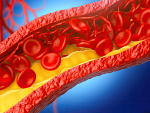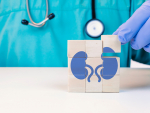Displaying items by tag: division of cardiovascular disease
The program is designed specifically to treat women and address the distinct concerns and unique risk factors that women may experience.
Tagged under
A large nationwide study found that Black individuals carrying a genetic mutation in the TTN gene were at an increased risk of adverse clinical outcomes.
Tagged under
Pulsed-field ablation disrupts the cellular membranes of vein tissue, irreversibly preventing those membranes from conducting electricity. This protects the heart from the rapid impulses which can cause atrial fibrillation.
Tagged under
UAB researchers leverage data from the SPRINT trial to show that intensive control of blood pressure reduces troponin I levels and this decrease in troponin I levels is associated with reduced risk of cardiovascular disease.
Although living with his congenital heart defect has come with its challenges, Bill Wingate hopes he can encourage others with similar conditions.
Tagged under
Tagged under
A post-hoc analysis of critically ill COVID-19 patients revealed that high-dose inhaled nitric oxide therapy was more beneficial in reducing the risk of mortality in Black patients compared with their white counterparts.
At 15 months old, Brooke Miley Lillie received a heart transplant. At 19, she received a kidney. At 27, she defied the odds and delivered her first daughter at UAB Hospital.
Tagged under
- release
- department of surgery
- division of cardiothoracic surgery
- division of transplantation
- comprehensive transplant institute
- department of medicine
- division of cardiovascular disease
- division of nephrology
- department of obstetrics and gynecology
- division of maternal fetal medicine
- department of pediatrics
- division of neonatology
- women and infants services
- uab hospital
A UAB study evaluating the treatment of severe dyslipidemia showed that only one in three individuals with severe dyslipidemia took lipid-lowering medications without any improvement in the treatment rates over 10 years.
Tagged under
UAB Hospital practice areas were honored with the “Best Hospital” designation, including cancer care, heart care, stroke care, minimally invasive surgery, comprehensive breast care, mammograms, obstetrics and women’s services.
Tagged under
Tagged under
A UAB expert is offering some of their top tips on how to avoid holiday heart syndrome and enjoy a heart-healthy holiday season.
Tagged under
UAB researchers leverage All of Us Research Program nationwide data from a diverse group of individuals to show that the genetic risk of hypertension varied between males and females.
Tagged under
UAB researchers conducted a landmark study that established the reference intervals for natriuretic peptides — hormones that regulate a range of beneficial bodily functions — and revealed that natriuretic peptide deficiency increases the risk of cardiometabolic diseases.
Tagged under
UAB researchers conducted a study in end-stage heart failure patients with cardiogenic shock that revealed that B-type natriuretic peptide levels were elevated in end-stage heart failure but did not predict clinical outcomes.
Tagged under
The newly introduced kidney function equation has value in predicting heart failure comparable to the old equation but may reduce racial disparities by improving access to heart failure therapy among Black heart failure patients.
Cure HHT has named the HHT Clinic at UAB Hospital a Center of Excellence. Only hospitals equipped with the proper personnel, expertise, commitment and resources to provide comprehensive evaluation, treatment and education to individuals with HHT and their families receive this designation.
Tagged under
UAB researchers conducted a nationwide population-level study to assess the cardiovascular health in Asian American adults. Results revealed that cardiovascular health declined in foreign-born Asian Americans by 28 percent from 2011-2020.
Tagged under
UAB researchers conducted a study including approximately 20,000 left ventricular assist device recipients and found that women had worse clinical outcomes compared with men across social and clinical subgroups of interest.
UAB experts discuss changes women should be aware of as their bodies mature and what exams they should receive during different time periods.
Tagged under



















